

FISCALITÉ L’économie informelle en Afrique : la porte de sortie pour les pays Africains ? Certains l’appellent l’économie non-contrôlée ou l’économie de la débrouillardise, d’autres, l’économie souterraine ou l’économie populaire.
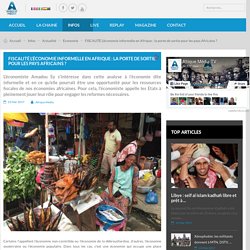
Dans tous les cas, c’est une économie qui occupe une place prépondérante dans l’économie des pays « appauvris », notamment ceux d’Afrique pour une moyenne de 70% de la population active. Bien que difficilement identifiable et mesurable, elle est sans doute écartée des comptabilités publiques et échappant à toute politique fiscale. Les Etats sont en carence de stratégies adaptées pour valoriser les produits de l’économie informelle et ramener le gros des activités qu’elle recouvre dans le système formel. L’économie informelle existait bien avant les indépendances des pays africains dans les années 1960. Après les indépendances, elle s’est accentuée dans un contexte des « trente glorieuse » dont les effets se sont ressentis jusqu’en Afrique, notamment à travers des investissements directs étrangers (IDE) des pays occidentaux vers le vieux continent.
Cheap data could unlock SME market. Provision of free internet access in African could unlock massive business potential that can overshadow the US, Europe and Asia.
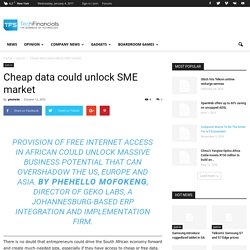
By Phehello Mofokeng, director of Geko Labs, a Johannesburg-based ERP integration and implementation firm. There is no doubt that entrepreneurs could drive the South African economy forward and create much-needed jobs, especially if they have access to cheap or free data. Boost Africa - empowering young African entrepreneurs. Boost Africa stems from a belief in entrepreneurship and innovation, and that both can play a significant role in accelerating living standards and social progress in Africa by meeting the needs of the people.
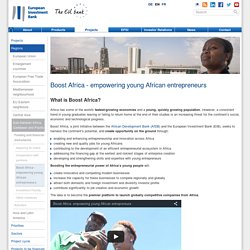
It will support the development of affordable solutions to fundamental challenges affecting those at the base of the pyramid, from access to energy and healthcare to financial services, education and internet connectivity. Supporting start-ups also means sustaining the democratisation of the economy, in a context characterised by an unequal distribution of wealth and high barriers for newcomers to start a business.
Driving private sector growth is the priority for the EIB on the African continent. EIB, AfDB launch Boost Africa to support 1,500 startups. The European Investment Bank (EIB) and the African Development Bank (AfDB) in partnership with the European Commission have launched Boost Africa, a EUR150 million (US$158 million) initiative to support 1,500 startups and SMEs across the continent.
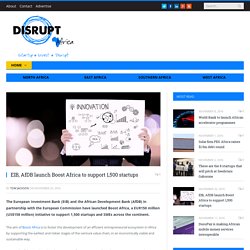
The aim of Boost Africa is to foster the development of an efficient entrepreneurial ecosystem in Africa by supporting the earliest and riskier stages of the venture value chain, in an economically viable and sustainable way. As a result of the initial combined investment of up to EUR150 million, the initiative is expected to leverage up to EUR1 billion (US$1.05 billion) in additional investments. AfDB Approves U.S.$10-Million Equity Investment in Tide Africa Fund. The Board of Directors of the African Development Bank (AfDB) has approved a US $10-million equity investment in the Technology and Innovation in Developing Economies (TIDE) Fund I to boost production and growth in Africa.
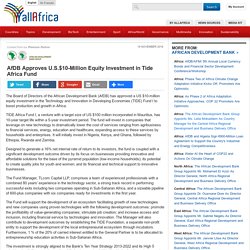
TIDE Africa Fund I, a venture with a target size of US $100 million incorporated in Mauritius, has 10-year target life within a 5-year investment period. The fund will invest in companies that leverage on new technology to dramatically lower the cost of services ranging from agribusiness to financial services, energy, education and healthcare, expanding access to these services by households and enterprises. La BAD et la BEI lancent un fonds pour financer 1500 PME et start-ups africaines. Why African Entrepreneurship Is Booming. Last month, I visited my village of Ovim in Southeastern Nigeria.

I met a painter who also manufactures the paint he uses for his work. According to him, his business nearly collapsed early in the year when he could not access the foreign exchange market to import the raw materials required for his paint production. At that time, the Nigerian central bank was running a currency control regime which stifled the importation of goods for small businesses. But despite these challenges, the painter came up with new ideas to keep his business going. He created a new type of paint, from non-toxic materials, using materials sourced locally. My experience is typical in the continent these days. We contribute to peace, stability and economic growth by building markets and creating jobs. Africa's Most Promising Entrepreneurs: Forbes Africa's 30 Under 30 For 2016. Guest post by FORBES AFRICA’s Ancillar Mangena Hanta Tiana Ranaivo Rajaonarios of Madagascar, founder of Fl0re Aroma (photo credit: Felana Rajaonarivelo/Fireflies) You may not know many of their names now, but in 20 years’ time, they could be on the cover of FORBES AFRICA.
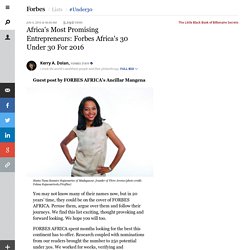
Peruse them, argue over them and follow their journeys. We find this list exciting, thought provoking and forward looking. We hope you will too. FORBES AFRICA spent months looking for the best this continent has to offer. Lancement du club africain des entrepreneurs à Abidjan. Abidjan, le 02 juin 2016 – Association ivoirienne ayant vocation à contribuer à l’émergence d’une classe entrepreneuriale panafricaine, le Club Africain des Entrepreneurs a été officiellement inauguré ce jeudi 2 juin 2016 à Abidjan dans les locaux de la Banque Africaine de Développement (BAD).
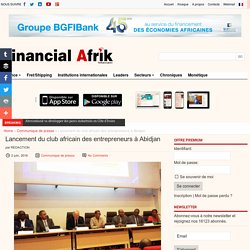
Le Club Africain des Entrepreneurs est né sous l’impulsion du groupe Investisseurs & Partenaires, et ce afin de favoriser les échanges de bonnes pratiques, d’expérience et d’opportunités d’affaires entre les entrepreneurs accompagnés par Investisseurs & Partenaires (I&P) depuis 2002. Les 30 meilleurs jeunes entrepreneurs d'Afrique en 2014. Jamais une génération de jeunes Africains n’aura été aussi inspirée.
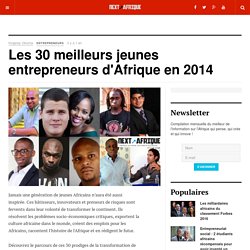
Ces bâtisseurs, innovateurs et preneurs de risques sont fervents dans leur volonté de transformer le continent. Access to capital a major hindrance to start-ups in Africa. 3 Steps to Transition Your Business and Successfully Penetrate Africa. (Image: C Moore Media) It’s no secret: Africa is a continent that is being touted by experts, residents, and media alike as a more-than-emerging, enterprise gold mine.
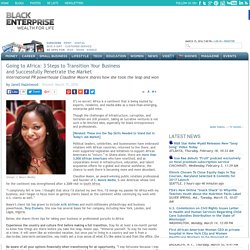
Though the challenges of infrastructure, corruption, and terrorism are still present, taking on lucrative ventures is not such a far-fetched idea, especially for black entrepreneurs and professionals. Kellogg's new push to help smallholder farming women. Like most multinational food companies, Kellogg relies upon a far-flung supply chain of farmers spanning five continents and dozens of countries to grow its ingredients. $12.5m for women-owned SMEs in Ghana, other countries. Business News of Sunday, 20 December 2015 Source: classfmonline.com African Development Bank.
African entrepreneurs see training as vital. This content is available for Premium Subscribers only Premium features include the agenda-setting Lex column, EM Squared, Martin Sandbu’s Free Lunch, Newsmine blog, daily FT ePaper and exclusive weekly emails designed to enhance your FT experience. Upgrade now Lex The FT’s daily guide to the corporate and financial stories that matter. Building Africa: Oil dealer Total launches plan to finance start-ups in Africa - Energy.
French oil company Total has launched a programme to finance African start-ups. The initiative, started in Addis Ababa, Ethiopia, last week, will fund and technically support the businesses in 34 countries on the continent where the firm operates. “This programme/ challenge is part of the project we are launching in 34 African countries with the aim of encouraging competitive and potential businesses by African youth that create jobs,” said Mr Lassina Toure, Total Ethiopia’s managing director, at the launch.
From the beginning of this month to the end of January 2016, Ethiopians below 35 years with innovative and original business ideas can submit their plan to Total’s Start Uppers Challenge online portal, according to Mr Toure. SME Innovation: African Partner Pool hits 1000 SME subscribers milestone - SME. The African Partner Pool has hit a milestone 1000 SME registrants after one year of activation. www.africanpartnerpool.com Ghana's cross sector online directory that create a platform for buyers and supplies to connect locally and internationally.
‘Entrepreneurs in 54 African countries to access $100m’ SMEs will create 80% of Africa’s employment –Analyst. SUNDAY TIMES - Break out of your comfort zone to thrive. PME: les premiers crédits seront accordés en novembre 2015. Business News of Friday, 9 October 2015. SMEs: small struggles, big rewards. Photos© Illustration by Séverin Millet Governments and other institutions are looking for ways to help small companies, which are major creators of employment and economic growth, to access funding from commercial lenders Nnakeme Gbelebu pores over a list. It is a feeding schedule for fingerlings, the small fish he hopes to grow into a commercial catfish catch at his fish farm outside Benin City in Edo State, Nigeria. What young Africans want from business education programmes. Walter Baets, University of Cape Town If you ask people what they consider the world’s most prestigious business degree, most are likely to answer, “An MBA.”
Indeed, the Master of Business Administration remains a hugely popular business degree and still impresses many employers. Germany, the Netherlands, Poland and Denmark are among 29 countries where interest in the MBA is at a nine-year high. There are a number of growing Asian and South American countries on the same list. But Africa is bucking the trend. New Uniform Insolvency Act Can Help African SMEs Improve Access to Finance in 17 Countries. With support from the World Bank Group, 17 African countries, members of the Organization for the Harmonization of Business Law in Africa (OHADA), adopted a Uniform Insolvency Act last week in Côte d'Ivoire.
This new law replaces the previous 1998 law which was widely believed to be lacking key features of a modern insolvency regime, particularly as regards reorganization proceedings and the treatment of creditors. The World Bank and the International Finance Corporation worked with OHADA to provide technical assistance with respect to the Act. Microsoft Word - SME and growth MENON v8.docx - SME and growth MENON [FINAL].pdf.
DEMO Africa « les entrepreneurs africains doivent penser global »